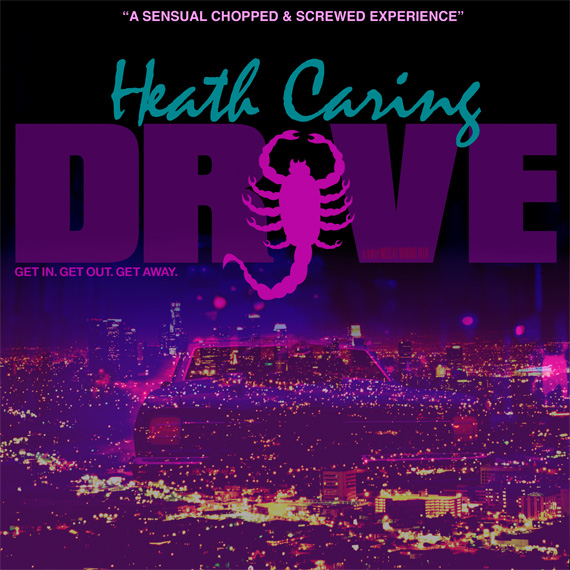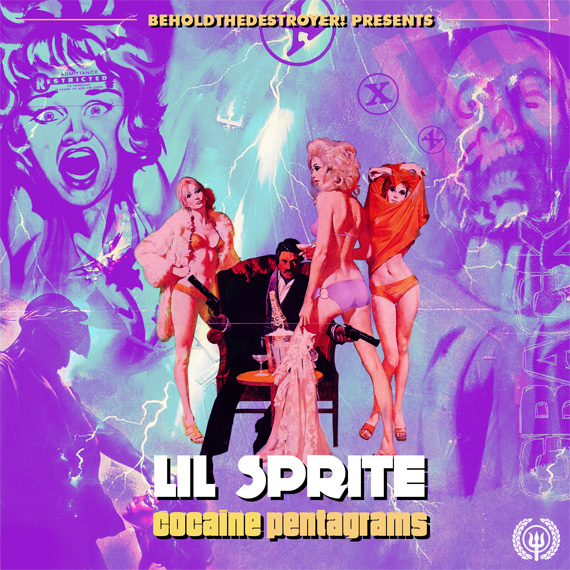
“Should’ve known I couldn’t show ‘im no better than I was shown.” [Goodie MOb’s “The Experience”]
May 8th, 2012 Posted by david brothersThe Damon Albarn Appreciation Society is an ongoing series of focused observations, conversations, and thoughts about music. This is the sixteenth. This is something I wrote in a burst just after getting off a plane about Goodie MOb’s “The Experience.” It’s… freestyled, for lack of a better term, in that I started with the idea of writing about the song and my reaction to it and let the essay go where it wanted to go. I dunno if it works, but I’m gonna let it ride because that seems like the right decision to make right now.
Minutes from previous meetings of the Society: The Beatles – “Eleanor Rigby”, Tupac – Makaveli, Blur – 13 (with Graeme McMillan), Blur – Think Tank (with Graeme McMillan), Black Thought x Rakim: “Hip-Hop, you the love of my life”, Wu-Tang Clan – Enter The Wu-Tang (36 Chambers), On why I buy vinyl sometimes, on songs about places, Mellowhype’s Blackendwhite, a general post on punk, a snapshot of what I’m listening to, on Black Thought blacking out on “75 Bars”, how I got into The Roots, on Betty Wright and strong songs, on screw music
I don’t know where I’m going with this one. I just got off a plane and this song came up on shuffle, and I felt like I should write about it. Follow along and hopefully we’ll get somewhere interesting. Strictly rough copy.
I wish I could say I remember the first time I heard Goodie MOb’s “The Experience,” off that Still Standing album. It’d make for a nice and neat story, a life-changing event that I could point to like the first time I saw Spike Lee’s Malcolm X. But I don’t remember the first time I heard it. I do have fond memories of going through the liner notes of my uncle’s CD. I’m not from Atlanta. I’m from a hour or so south of Atlanta, the country. I didn’t think it was the country growing up, I thought it was a real-deal city. So seeing those liner notes was interesting, because it was like peeking into another neighborhood. There was a slang dictionary in there, I think, that explained some of the real specific stuff that the Dungeon Family used to shout out, like SWATs or whatever. As a kid, I didn’t even get that the song “Inshallah” was specifically a Muslim thing, even though — on another song — Cee-Lo at one point says “I’m Islam, and we don’t want no bad blood, but it is some, it is some.”
But “The Experience” is a thunderclap to me, even nowadays. It’s just Cee-Lo Goodie’s voice, a light melody, and various versions of the word nigger for a couple minutes. It’s the sort of thing that the Dungeon made their stock in trade, another good example of which would be the Big Rube interludes on other Dungeon records. The Dungeon Family worked because they mixed knowledge with raw raps. And this song is the epitome of that for me.
I don’t know the actual accepted term for it, but there’s this thing I think about a lot that I call useful fictions. They’re things like the idea that black people come from a lineage of kings and queens in Africa. Basically, they’re like… they’re cheat codes. Imagine that living in America is like being in a race. One entrant in the race is forbidden from racing for hundreds of years, but is the guy who has to clean the track and paint the lines. When the officials finally let this guy into the race, they make him start half a mile back. When the guy finally sues and gets the right to start from the same starting line as everyone else, they sabotage his shoes and pretend like nothing is wrong.
This has a debilitating effect on morale. It destroys egos and families. The men and women trade abuse out of frustration, parents pass it on down to their children, and the children grow up with that poison in their system. And on it goes, on down the generations, until we hit today. Or maybe not today. I can’t speak to the current status quo. But I’m an ’80s baby, and I can guarantee you that things were a little sour growing up, both in terms of blatant racism and things like basic access to things that could make your life better, from education to living in a neighborhood that doesn’t suck.
So these useful fictions are cheat codes because they let you get a leg up. They serve as a tonic that acts against the poison that’s force-fed to black babies as soon as they’re old enough to talk. When I was growing up, black history was the guy who invented the peanut, the guy who got shot and had a dream, the angry black devil, the lady who ran the underground railroad, slavery, and Dred Scott. That was about it. Black history was a tale of misery and hate, with our contributions to the country either minimized or ignored completely.
The rest of history class was positively triumphant in comparison. Rome. England. Magna Carta. Greatest Generation. George Washington. Inventing lightning. Betsy Ross. “Look how awesome we are!” all day every day. Never mind the state-sponsored terrorism and hate crimes or slave labor or whatever. That was… not excused, exactly, but nobody looks at slaveholders like people today look at Nazis.
So those useful fictions are important. If your history is stolen from you, you have to invent one of your own. And if you’re going to invent one, it might as well be a good one. Kings and queens. Little Richard inventing every single aspect of rock’n’roll. Whatever whatever. I get it. And, more importantly, I greatly appreciated it.
In “The Experience,” Cee-Lo says a lot of silly stuff, but it’s not about the truth, really. It’s about grabbing somebody by the neck and making sure they pay attention. It’s about getting somebody to do better because they need to do better. I love the part when Cee-Lo says “She looked deeply into my eyes and said, ‘Brother, don’t you know? You complain about being black, when they mad ’cause they can’t be black no more.'” It’s laughable, because as near as I can tell, being white is awesome. No racist is sitting in her shack like “Ugh I wish I looked like Iman.” Please. I guess maybe if she’s more of a David Bowie stan than a racist, but that’s a big if.
But it’s a useful fiction, because it speaks to the idea that black people are more than they are. More than poverty, more than hate, more than fear, more than niggers. It speaks to the idea that the black man is the original man, a valuable part of history, and something to be not just respected, but jealous of. It puts that idea in your head, and the truth of it is entirely beside the point. It’s something that you have to embrace just to keep your head above water. It’s a life raft. “This isn’t all there is. We are more than this.”
If you put a gun to my head and told me to pick a favorite bit from this song, it’d probably be: “Since then a nigga done got grown, had a little bitty of nigga of my own/ should’ve known I couldn’t show ‘im no better than I was shown.” It’s such a sad statement, and the “should’ve known” puts it clearly in the past tense, like mistakes have been made. And it’s absolutely true. If you don’t know better, whether your knowing is composed of useful fictions or the actual incredible history of black people, you can’t do better. You need that knowledge or optimism or whatever to make things work, to crawl your way out of the muck. And it’s generational. If I can’t do better, then what is my son supposed to do? What am I supposed to teach him? Each generation improves on the next one, but no generation is perfect. I inherited some poison, despite my family’s best efforts, and because of them in some cases. It takes a long time to work that out of your body.
I’m appreciative of every single useful fiction people told me as a kid that convinced me I had worth before I knew the real story of that worth. I would much rather have a lie that helps me that I have to exorcise later than one that weighs down my shoulders. One of those is training wheels. The other is a thin wire stretched across a hallway. I love every rap song about how dope it is to be young, rich, and black. I love every t-shirt that says “DANGER: EDUCATED BLACK MAN.” I love every single thing that showed me that I had something to aspire to, and that I could (thus far at least) do something like make my own way in the world.
“The Experience” was really valuable to me growing up. It’s still valuable, even, but I’ve moved past some specific aspects of it. Like how “When in actuality, the fact is you ain’t a nigger because you black. You a nigger ’cause of how you act” is just old poison in a new, self-hating form, for example. But as a song, as something someone wrote and performed and pressed to disc, I’m deeply appreciative of it. It runs through my head every couple of weeks. It’s extremely resonant, on par with Blur’s “No Distance Left To Run” or “She Said She Said” by The Beatles or Tupac’s “Dear Mama” and “So Many Tears.”
There’s just something about it that crawls up inside your guts and makes room for itself. It’s kind of a mirror, in that it forces you to stop and look at what you think and why. I think a lot, not all but definitely a lot, of great songs, books, movies, poems, and whatever else make you do that. You make some type of connection with the content that goes beyond shaking your butt or nodding your head. That’s where favorite songs and anthems come from.
That’s probably why I keep coming back to “The Experience.” My racial identity, how I think about race, whatever whatever, evolves constantly. Listening to this song puts me in mind of a time when I thought differently, even if it was just a couple years ago, and makes me recognize whatever strides, or lack thereof, that I’ve made. I can’t passively listen to it.



